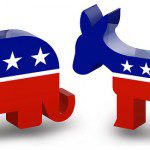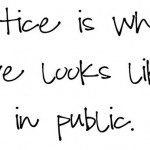 I told this story in my sermon Sunday:
I told this story in my sermon Sunday:
I met a new friend the other day, who, upon finding out I was a pastor, asked me a question framed with a story. “What should pastors be saying about this election?,” he started. “I am so frustrated!,” he continued. “After church two Sundays ago I pulled my pastor aside during coffee hour and said I’d been surprised she wasn’t talking about the political situation in our country. I mean, not even a reference!’
“So I said to her, ‘Pastor, can you tell my how my faith might help me make sense of this unbelievable political situation in our country?’”
“She looked at me, shaking her head, and said: ‘Well, I guess all I can tell you is that you should pray about it.’”
My new friend looked at me, incredulous. “Can you believe that? Pray about it? Her answer made me despair for the future of the church. Because if we’re not talking at church about how our faith informs our everyday lives, and especially this election cycle, then what is the point of church at all?”
I certainly felt my friend’s frustration in that moment, and I revisited the anxiety I think many pastors feel about speaking to political realities and societal sins from the pulpit. We deal in the spiritual, not the political; we learn a healthy respect for the separation of church and state; and let’s just be honest: we’re scared, sometimes, to offend the folks who pay our salaries.
If this current political climate and the grave injustice that keeps coming to light in our society has done nothing else, they have already taught us that those fears are not enough to justify a “just pray about it” answer. We are being called to examine a little more closely the responsibilities of our platforms, to refuse the easy excuse “politics and public policy are not my wheelhouse,” and to lead the church into its rightful prophetic role.
As the desperation of our country headlines every news cycle these days, I keep thinking about four things related to this pastoral struggle.
First, we cannot escape the politics. Many pastors and congregations want to keep politics out of the pulpit because they want to believe politics and faith don’t inform each other, and certainly don’t have any bearing on everyday life. Between school drop offs and doctor’s appointments and soccer games, keeping up with every urgent social issue and campaign speech is exhausting. Why spend free time engaging in hard, uncomfortable conversations? But we can only segregate from issues of gun violence, racial injustice, immigration, extreme poverty and income disparity for so long before these issues erupt into the lives of our church members. Newtown, Aurora, Cleveland, Dallas, San Bernardino, Orlando, Ferguson: the issues we see on the news exist in every town and city in our country, and when our congregation members are impacted by them, as they will be, we will be asked why we have not created the space in church for these conversations. And we will see clearly the malpractice in our cowardice.
Second, as church attendance in America declines at a steady rate, any pastor who is paying attention has to ask: why is the church here? If we can’t proclaim a message that, as Walter Bruggemann says, “has an impact on persons, impinges upon perception and awareness, intrudes upon public policy, and evokes faithful and transformed behavior,” we might need to ask ourselves if we’re being the church in the radical way of Jesus, or if we find ourselves tending to elaborate Sunday morning social clubs. In proud biblical tradition, there must be an element of prophetic fire to the words we proclaim from the pulpit.
Third, if we really believe what we say, that our faith should inform the whole of our lives, then we cannot leave our values and beliefs at the door when it comes to public discourse. While the separation of church and state is critically important to the freedoms we experience in America, I wonder if we use it too much as a convenient excuse not to talk about some very hard and uncomfortable things. Separation of church and state insures that government does not exercise control over religion or favor one religion over another. It does not mean we separate our values from our public engagement. Some peoples’ values are informed by Plato or Ayn Rand of Machiavelli. If your values are informed by the teachings of Jesus, you may bring those values to bear on public discourse. You must bring them to bear on the public discourse.
And fourth, in this election year in particular, it’s important to note that the political situation in which we find ourselves is so far from a discussion of differing policies. We are confronted everyday with rhetoric that is blatantly opposed to the teachings of Jesus, behavior we teach our kindergarteners not to engage in on the playground. If we won’t say publicly that this is wrong, I have to wonder: who will?
If you are a churchgoer whose pastor won’t talk about the critical issues facing our country and about this election cycle in which we find ourselves, please don’t go home and pray about it. Go talk to your pastor and tell him to speak up. It’s hard to make people mad, and knowing you’re not alone helps your pastor gather his courage.
If you are a pastor who hasn’t spoken up in the pulpit about how our faith informs our lives and calls us to action around guns or racism or hateful rhetoric from our leaders, please take a few minutes to remember why you started doing this work in the first place. If gospel still gets you into the pulpit every Sunday, then preach it loud and clear. And don’t be afraid.
Follow Pastor Amy on Facebook, Twitter, and Instagram – @PastorAmyTRC
Originally posted on Baptist News Global.












